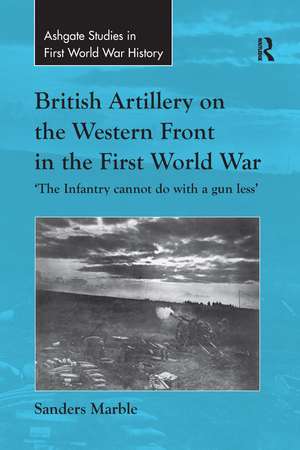British Artillery on the Western Front in the First World War: 'The Infantry cannot do with a gun less': Routledge Studies in First World War History
Autor Sanders Marbleen Limba Engleză Paperback – 9 sep 2016
| Toate formatele și edițiile | Preț | Express |
|---|---|---|
| Paperback (1) | 473.88 lei 6-8 săpt. | |
| Taylor & Francis – 9 sep 2016 | 473.88 lei 6-8 săpt. | |
| Hardback (1) | 1059.84 lei 6-8 săpt. | |
| Taylor & Francis – 22 mar 2013 | 1059.84 lei 6-8 săpt. |
Din seria Routledge Studies in First World War History
-
 Preț: 316.13 lei
Preț: 316.13 lei -
 Preț: 310.36 lei
Preț: 310.36 lei -
 Preț: 330.33 lei
Preț: 330.33 lei - 18%
 Preț: 836.89 lei
Preț: 836.89 lei -
 Preț: 489.26 lei
Preț: 489.26 lei - 21%
 Preț: 255.40 lei
Preț: 255.40 lei -
 Preț: 389.66 lei
Preț: 389.66 lei -
 Preț: 469.34 lei
Preț: 469.34 lei - 17%
 Preț: 259.98 lei
Preț: 259.98 lei - 18%
 Preț: 995.58 lei
Preț: 995.58 lei -
 Preț: 384.70 lei
Preț: 384.70 lei -
 Preț: 491.17 lei
Preț: 491.17 lei -
 Preț: 416.63 lei
Preț: 416.63 lei - 18%
 Preț: 1056.80 lei
Preț: 1056.80 lei - 18%
 Preț: 998.71 lei
Preț: 998.71 lei -
 Preț: 469.34 lei
Preț: 469.34 lei -
 Preț: 389.66 lei
Preț: 389.66 lei -
 Preț: 469.34 lei
Preț: 469.34 lei - 15%
 Preț: 305.52 lei
Preț: 305.52 lei -
 Preț: 469.34 lei
Preț: 469.34 lei - 12%
 Preț: 299.52 lei
Preț: 299.52 lei -
 Preț: 389.66 lei
Preț: 389.66 lei - 25%
 Preț: 824.80 lei
Preț: 824.80 lei - 18%
 Preț: 1059.84 lei
Preț: 1059.84 lei - 18%
 Preț: 1000.27 lei
Preț: 1000.27 lei -
 Preț: 489.26 lei
Preț: 489.26 lei - 18%
 Preț: 1110.47 lei
Preț: 1110.47 lei -
 Preț: 489.26 lei
Preț: 489.26 lei - 18%
 Preț: 1000.27 lei
Preț: 1000.27 lei - 21%
 Preț: 256.32 lei
Preț: 256.32 lei - 16%
 Preț: 216.07 lei
Preț: 216.07 lei - 26%
 Preț: 820.32 lei
Preț: 820.32 lei
Preț: 473.88 lei
Nou
Puncte Express: 711
Preț estimativ în valută:
90.68€ • 94.49$ • 75.08£
90.68€ • 94.49$ • 75.08£
Carte tipărită la comandă
Livrare economică 03-17 aprilie
Preluare comenzi: 021 569.72.76
Specificații
ISBN-13: 9781138270466
ISBN-10: 1138270466
Pagini: 304
Dimensiuni: 156 x 234 x 26 mm
Greutate: 0.56 kg
Ediția:1
Editura: Taylor & Francis
Colecția Routledge
Seria Routledge Studies in First World War History
Locul publicării:Oxford, United Kingdom
ISBN-10: 1138270466
Pagini: 304
Dimensiuni: 156 x 234 x 26 mm
Greutate: 0.56 kg
Ediția:1
Editura: Taylor & Francis
Colecția Routledge
Seria Routledge Studies in First World War History
Locul publicării:Oxford, United Kingdom
Cuprins
Contents: Preface; Introduction; The legacy of the Boer War; 1914: the test of battle; 1915: new ideas and material scarcity; 1916: the materielschlacht begins; 1917: an apogee of destruction; 1918: power and finesse; Conclusion; Appendix; Bibliography; Index.
Notă biografică
Sanders Marble received his A.B. at the College of William & Mary in Williamsburg, Virginia and MA and PhD from King’s College, University of London. He works for the U.S. Army Medical Department. His research interests are WWI, military technology, and military medicine, and he has written and edited a variety of books, chapters, and articles on various aspects.
Recenzii
'... examines one of the more challenging adaptation processes, namely the British mastery of artillery fire on the Western Front and its contribution to Germany’s defeat in 1918. In this undertaking Marble has written an impressive book that deserves space on the shelves of serving soldiers as well as all serious scholars of the Great War... It is a fine achievement.' Journal of Military History '... a very accurate and informative book-length treatment of the Royal Artillery...' Michigan War Studies Review 'This book is an essential addition to the library of any person studying the BEF and its methods during the Great War.' Journal of the Society for Army Historical Research
Descriere
Providing a systematic investigation into the evolving role of the artillery in the British Expeditionary Force, this study looks at how tactical and operational changes affected the overall Allied strategy. In line with the 'learning curve' thesis, it argues that despite many setbacks and missed opportunities, by 1918 the Royal Artillery had developed effective methods to overcome the defensive advantages of trench warfare that had mired the Western Front in bloody stalemate for the previous three years.
